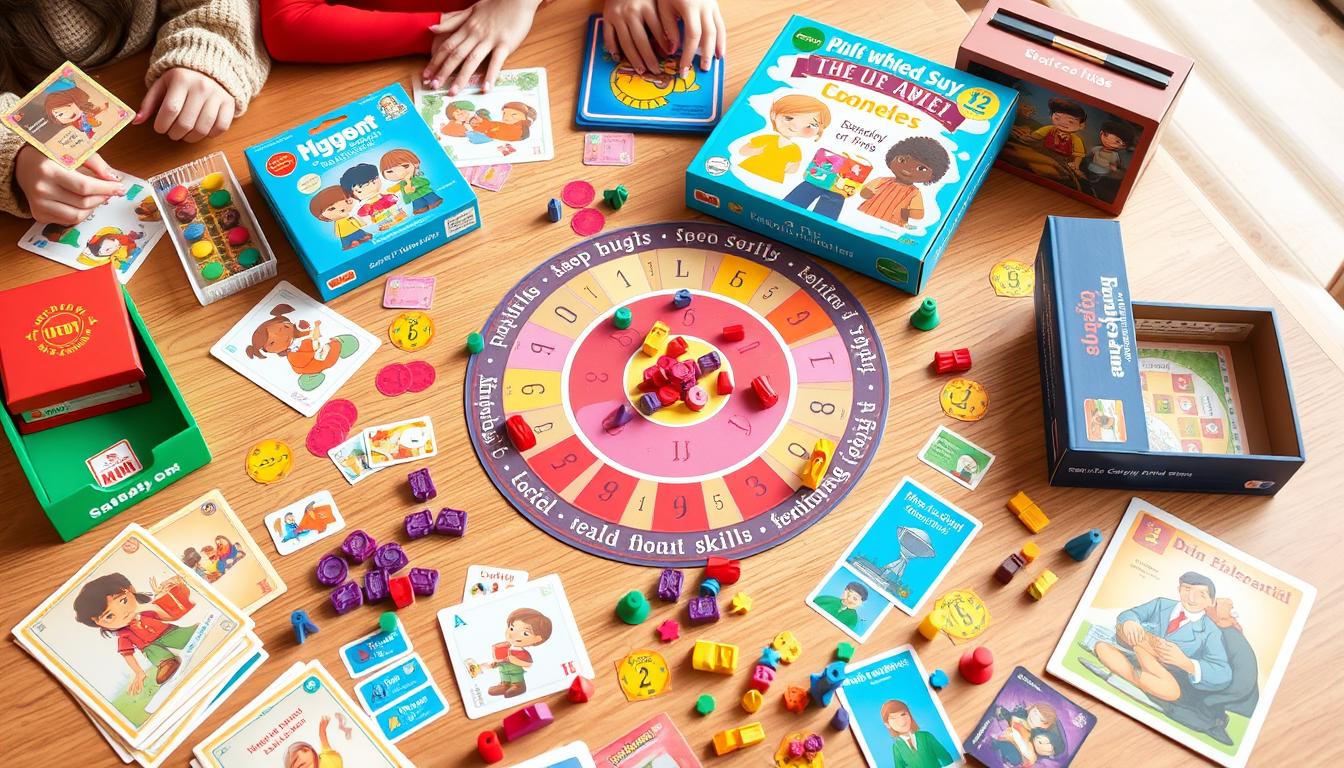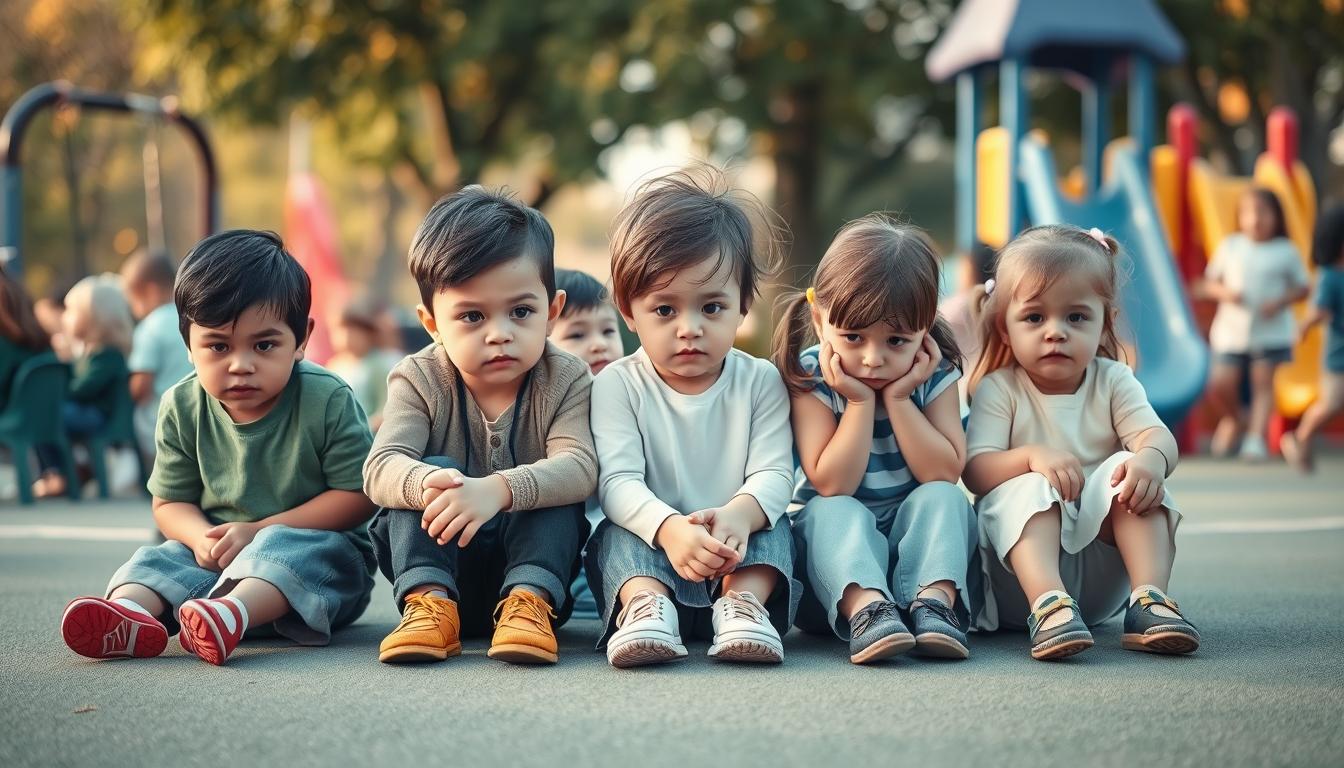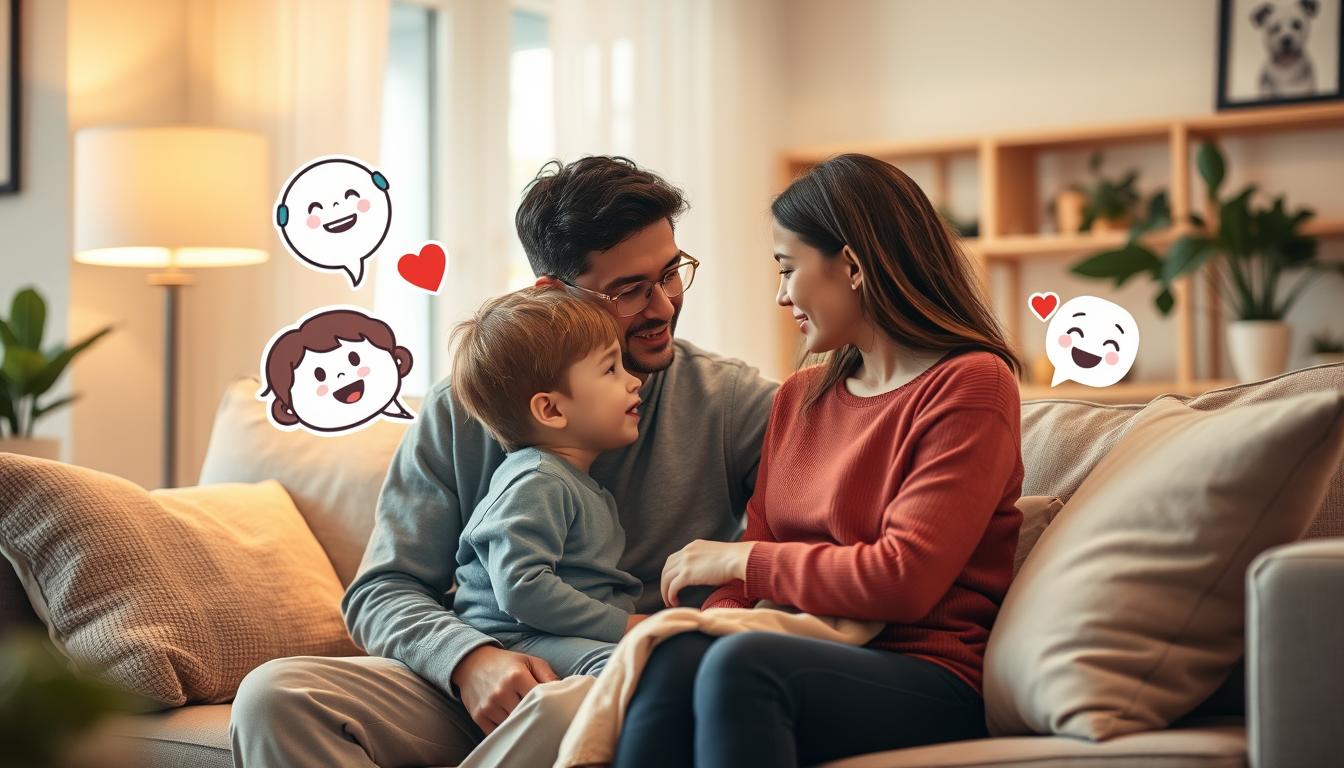Did you know that 87% of child psychologists recommend board games as powerful tools for developing social and emotional skills? These games are more than just fun—they’re learning tools that help kids understand themselves and others.
I’m passionate about child development, and I’ve found that board games are amazing for teaching life skills. They offer a fun way to learn that traditional methods often can’t match.
Social skills games give kids a safe place to practice talking, feeling empathy, and understanding emotions. It’s not just about winning or losing. It’s about learning to navigate social situations through play.
Emotional intelligence games help kids recognize and manage their feelings. They also learn how to deal with others. These games turn learning into a fun adventure.
Key Takeaways
- Board games offer structured learning environments for social skills
- Play-based learning enhances emotional intelligence
- Interactive games teach communication and empathy
- Children learn complex social dynamics through enjoyable experiences
- Board games provide safe spaces for emotional skill development
Understanding the Power of Board Games in Social-Emotional Development
Board games are more than fun. They help kids learn and grow, teaching them how to interact with others.
Play-based learning changes how kids interact and think. It helps them understand social dynamics better. These games are great for emotional and cognitive growth.
The Science Behind Play-Based Learning
Studies show that board games boost brain areas for social skills and emotions. Kids learn important social skills through these games:
- Emotional self-control
- Turn-taking behaviors
- Understanding social cues
- Managing disappointment
How Board Games Shape Neural Pathways
Playing games makes new connections in the brain. These connections help with emotional intelligence. Kids develop:
- Enhanced problem-solving skills
- Improved communication strategies
- Deeper empathy understanding
“Play is the highest form of research.” – Albert Einstein
The Role of Structured Play in Child Development
Structured board games offer a safe space for kids to practice social skills. These games help build emotional skills.
| Game Type | Skill Developed | Age Range |
|---|---|---|
| Cooperative Games | Teamwork | 4-8 years |
| Strategy Games | Critical Thinking | 7-12 years |
| Role-Playing Games | Empathy | 6-10 years |
Board games are not just games—they are sophisticated learning platforms that nurture social and emotional growth.
Board Games for Developing Social and Emotional Skills: Core Benefits
Emotional Intelligence Board Games are a powerful tool for improving social skills. They offer more than just fun – they provide essential learning experiences for all ages.
These games have many benefits for development:
- Enhanced communication skills
- Improved emotional regulation
- Increased empathy and perspective-taking
- Advanced problem-solving capabilities
Research shows that these games create special environments for learning. The magic happens when learning feels like play.
“Games are the most elevated form of investigation.” – Albert Einstein
These games help players develop important skills by:
- Reading emotional cues
- Understanding group dynamics
- Navigating competitive and cooperative scenarios
- Practicing emotional self-control
| Skill Developed | Game Mechanism | Developmental Impact |
|---|---|---|
| Emotional Awareness | Role-Playing Elements | Increased Empathy |
| Strategic Thinking | Complex Decision Making | Enhanced Problem Solving |
| Communication | Negotiation Scenarios | Improved Social Interaction |
By adding Emotional Intelligence Board Games to learning settings, we create powerful experiences. These experiences build vital social-emotional skills in a fun, stress-free way.
Essential Cooperative Board Games for Building Team Spirit
Cooperative board games have changed how we view gaming. They make players work together, not against each other. This creates learning experiences that improve social skills.
Teamwork is key in life, not just at work. Cooperative games help players improve communication, strategy, and teamwork. They make playtime a chance to learn and grow.
Games That Foster Collaboration
Many cooperative board games are great for building team spirit:
- Pandemic: Players team up to stop diseases
- Forbidden Island: A mission to get treasure before the island goes down
- Hanabi: A card game that needs careful communication
Team-Based Problem-Solving Activities
These games are all about working together. They help players develop important skills like teamwork and communication. Cooperative games turn play into a learning experience.
| Game | Key Skill Developed | Player Interaction |
|---|---|---|
| Pandemic | Strategic Planning | High Collaboration |
| Forbidden Island | Resource Management | Constant Communication |
| Hanabi | Non-Verbal Communication | Subtle Interaction |
Building Trust Through Play
“In cooperative games, success depends on trust and mutual understanding.” – Game Design Expert
Cooperative games offer safe spaces for players to build trust. They learn to communicate well and work towards common goals. These skills are useful in real life too.
Communication-Enhancing Games for All Ages
Communication Games are great for improving social skills at any age. I’ve seen how board games can change how people talk, learn, and connect. It’s amazing.
Games that focus on social skills help players get better at talking and listening. They learn to share their thoughts clearly and understand others better. It’s all through fun games.
“Games are not just play—they’re sophisticated learning environments that challenge our communication skills.” – Communication Expert
Key Communication-Enhancing Games
- Codenames: Develops word association and team communication
- Dixit: Encourages creative storytelling and interpretation
- Mysterium: Promotes non-verbal communication skills
These games offer a safe place for people to practice important social skills. They make learning fun by adding challenges. Players get better at sharing ideas, seeing things from others’ viewpoints, and working together.
Benefits Across Age Groups
| Age Group | Communication Skill Developed |
|---|---|
| Children (6-12) | Basic verbal expression and listening |
| Teenagers (13-18) | Complex interpretation and empathy |
| Adults (19-50) | Strategic communication and negotiation |
If you care about improving social skills, try these games. They’re perfect for both learning and having fun. They really help with communication.
Building Empathy Through Strategic Board Games
Empathy Games have changed how we learn about emotions. Strategic board games help us understand others better. They let us see things from different points of view and deal with complex social situations.
Emotional Intelligence Board Games are safe places to explore emotions. Players can try out different feelings without facing real-life problems. These games help us learn to understand and connect with others in a deep way.
Role-Playing Board Games
Role-playing games turn players into characters with their own stories. By becoming someone else, players learn to:
- See different emotional experiences
- Feel more empathy
- Get better at seeing things from another’s point of view
Perspective-Taking Activities
Games like Tales of the Arabian Nights offer deep storytelling. They make players think from many angles. These games help us think deeply about social issues.
| Game | Empathy Skill Developed | Player Age Range |
|---|---|---|
| Tales of the Arabian Nights | Cultural Understanding | 10-Adult |
| Pandemic | Collaborative Problem Solving | 8-Adult |
| Dixit | Emotional Communication | 6-Adult |
Understanding Others Through Gaming
“Games are the most elevated form of investigation.” – Albert Einstein
Playing Empathy Games helps us grow emotionally. These games are fun but also teach us a lot about people. They help us connect with others on a deeper level.
Self-Awareness Games That Build Emotional Intelligence
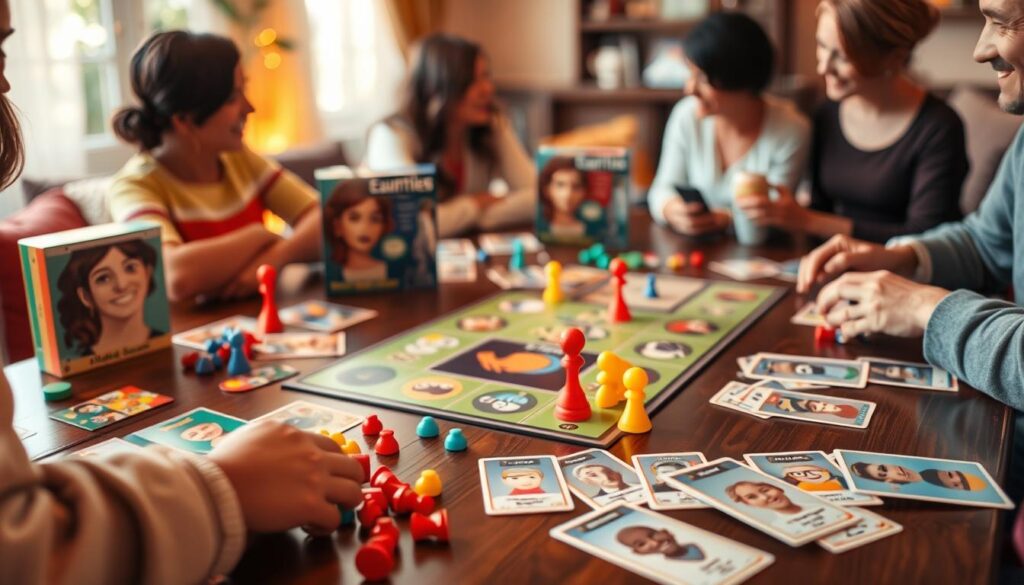
Self-awareness is key to understanding our feelings, strengths, and how we interact with others. Emotional Intelligence Board Games make learning these skills fun through play.
Exploring Self-Awareness Games, I found amazing tools that turn emotional learning into a fun adventure. These games help us grasp our emotions and how we connect with others.
“Play is often talked about as if it were a relief from serious learning. But for children, play is serious learning.” – Mr. Rogers
- Feelings in a Jar helps players identify and express complex emotions
- The Ungame encourages deep personal reflection
- Emotion Quest challenges players to recognize emotional states
Players learn a lot from these Emotional Intelligence Board Games. They:
- Learn to spot emotional triggers
- Grow empathy
- Get better at controlling their emotions
- Practice talking openly and honestly
These games make learning about ourselves and others fun for everyone.
Conflict Resolution Skills Through Board Game Scenarios
Board games are a great way to learn how to solve conflicts. Players get better at dealing with complex social situations. They learn to negotiate and solve problems in a good way.
Games that focus on conflict resolution are very helpful. They create a space where players can practice important life skills. These skills are useful in many areas, not just the game itself.
Negotiation-Based Games
Games like Catan and Diplomacy are all about negotiation. Players must:
- Speak clearly and try to convince others
- Find solutions that work for everyone
- Pay attention to how others act and feel
- Make deals that help them win without losing everything
Problem-Solving Through Competition
“In the world of board games, competition becomes a tool for understanding human interaction.” – Game Design Expert
Competitive games help players deal with conflicts in a good way. They learn to:
- Keep their cool when things get tough
- Think ahead and plan their moves
- See things from their opponent’s point of view
- Stay calm when things get hard
Managing Disagreements in Gaming
The skills players learn from these games are very useful in real life. They get better at listening, controlling their emotions, and working together. These skills help in many areas, like school and work.
| Skill Developed | Gaming Application | Real-World Benefit |
|---|---|---|
| Active Listening | Understanding game strategies | Improved personal communication |
| Emotional Regulation | Handling game losses | Better stress management |
| Collaborative Problem-Solving | Negotiating trade agreements | Enhanced workplace teamwork |
By playing these games, players turn conflicts into chances to grow and understand each other better. This leads to respect and cooperation.
Implementing Board Games in Educational Settings
Adding board games to classrooms and homes can change how we learn. These games help kids grow in social and emotional skills. They are great for teachers and parents looking for new ways to help kids.
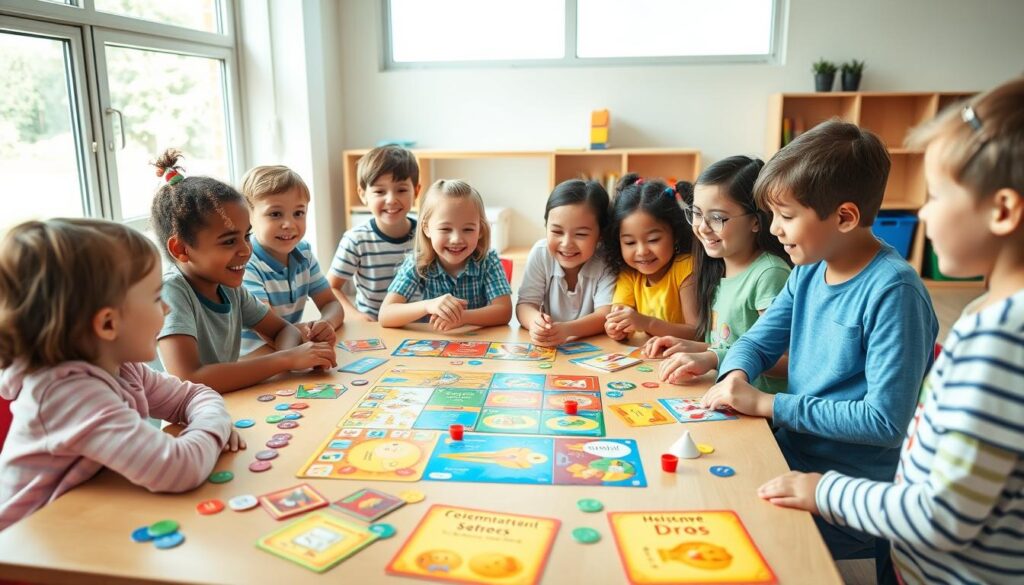
- Choose games that fit the child’s age
- Look for games that everyone can play together
- Find games that help kids talk and understand each other
- Make time for talking about feelings after playing
It’s important to guide the game play well. Set rules that help everyone get along. Teach kids to take turns, listen well, and speak kindly.
“Play is often talked about as if it were a relief from serious learning. But for children, play is serious learning.” – Mr. Rogers
Good games for social skills should be fun and a bit challenging. Look for games that:
- Need kids to work together and agree
- Have kids solve problems together
- Let kids show their feelings
- Help kids think ahead and plan
By using board games in schools and homes, we can make learning fun and help kids grow. It keeps them interested and eager to learn more.
Conclusion
Board games are more than fun. They help us learn important social and emotional skills. Games like these make learning exciting for kids and adults.
These games teach us how to interact better with others. They help us understand complex social situations in a fun way. This is great for personal growth.
Games improve our communication and empathy. They offer a safe space to learn about emotions and teamwork. This is all through playing games.
Parents and teachers can use these games to teach important skills. Games that make us think and work together are very helpful. They make learning feel like a game, not work.
Let’s all try using board games to learn more about ourselves and others. They’re great for learning in schools, at home, or in therapy. These games help us grow in many ways.

